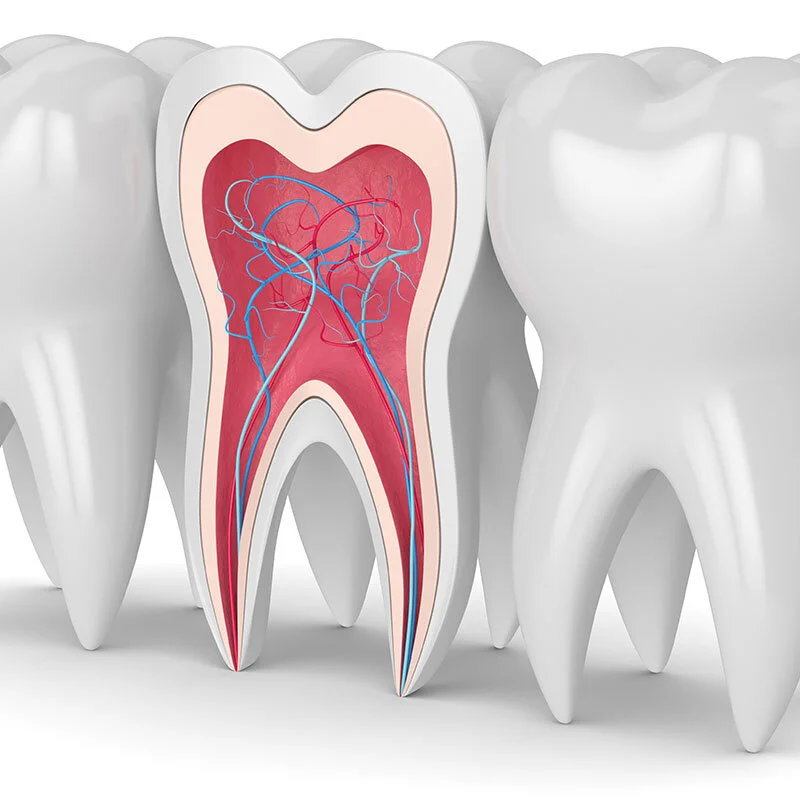Root Canal Treatment
What is root canal treatment?
Often also referred to as endodontic treatment, this dental procedure is aimed at removing infection from the innermost part of the tooth i.e. the centre of the tooth. The tooth is made up of 3 layers- the outermost being the enamel which is the hardest, beneath which is the softer dentine which supports the enamel and makes up the bulk of the tooth and lastly, right at the centre of the tooth is the pulp which is a soft tissue made up of blood vessels and nerves. When infection reaches the pulp, root canal treatment becomes necessary. This treatment involves removing the infected pulp tissue, thoroughly cleaning the pulp chamber and root canals and finally filling and sealing the canals.
How can an infection reach the pulp?
The most common cause is gross decay. Other causes include broken or fractured teeth, very large fillings, secondary decay under loose fillings, repeated fillings in the same tooth. On rare occasions severe periodontal or gum infections can also lead to infection of the pulp.
How will I know I need root canal treatment?
Your dentist will take an x-ray of your tooth. The x-ray will display the anatomy of the tooth and the dentist will be able to tell how far the infection has spread. Your dentist will then discuss the problem with you, he/she will explain the procedure and possible complications as well as other treatment options. Once you are completely informed you can make the decision to go.
How long will the treatment take?
Sometimes the treatment maybe completed in a single sitting, however more commonly it takes up to 2-3 visits to successfully complete the treatment.
What does the procedure entail?
Your dentist will give you a numbing injection which completely blocks pain from the area. A hole is made in the top of your tooth through which access to your root canals is gained. The dead or infected pulp tissue is removed and canals thoroughly cleansed. A medicament maybe applied based on extent of infection. Usually this is all that is done at the first visit. A temporary filling is placed to seal the tooth until your next visit.
At the 2nd visit the temporary filling is removed and the root canals are filled with gutta percha, a putty like material. The hole in the tooth is filled with a permanent filling material. The root canal treated tooth is more brittle than an untreated tooth and your dentist will advise you about placing a cap/crown on this tooth so as to protect the tooth from traumatic fracture. Sometimes the dentist may have to place a metal rod or screw into the root canal to support this crown.
If the infection in the tooth has not caused any serious problems your dentist may go ahead and complete the root canal treatment in the first sitting itself.
Is the procedure painful?
Your dentist will administer a local anaesthetic injection to you prior to starting the root canal treatment. The injection itself may cause a slight amount of discomfort however once the injection has taken effect the rest of the procedure is pain free. Once the treatment is completed there is likely to be some amount of soreness however the acute pain and discomfort you were feeling prior to commencement of the treatment will be relieved. Regular over the counter pain killers are effective in reducing the post operative discomfort which rapidly subsides in 24-48 hours.
How long will a tooth treated in this way last in my mouth?
With proper restoration and care the endodontically treated tooth could potentially last a life time. Endodontic success is estimated at 90%. However, sometimes the tooth does not heal as expected and in these cases the tooth may have to be retreated or may require a small surgery at the tip of the root called apicectomy and in rare instances the tooth may have to be removed.
What is the appropriate after care?
Brush your teeth twice daily and make sure you visit your dentist regularly. The dentist will want to assess the root canal treated tooth after a year and then on a regular basis thereafter.
What is the alternative to root canal treatment?
The alternative treatment is to extract or remove the tooth. However, every effort should be made to save the tooth. Once the tooth is removed a gap is created in the mouth which causes functional and aesthetic problems which may necessitate a tooth substitute to be Infected tooth Cleaned Filled Restored placed. This could be in the form of a denture, bridge or implant all of which may have varying costs.

